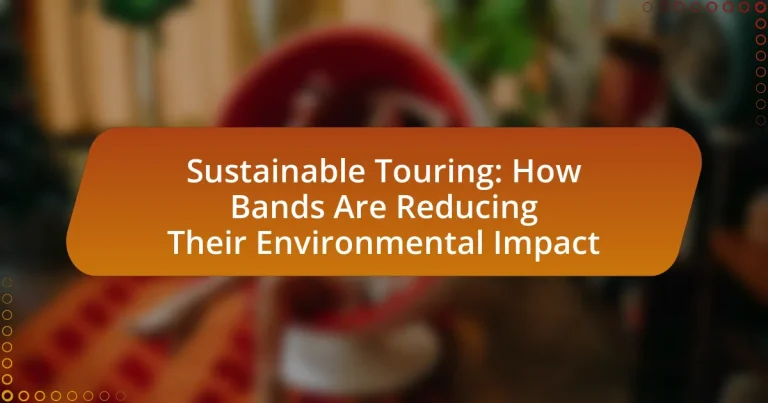Sustainable touring is the practice of organizing music tours with a focus on minimizing environmental impact and promoting social responsibility. This article explores how bands are adopting eco-friendly transportation, reducing waste, and sourcing local materials to decrease their carbon footprints. Key principles of sustainable touring include minimizing environmental harm, engaging with local communities, and ensuring economic viability. The article also highlights the challenges bands face in implementing these practices, such as financial constraints and logistical complexities, while emphasizing the role of fans in supporting sustainability initiatives within the music industry.

What is Sustainable Touring?
Sustainable touring refers to the practice of organizing and conducting music tours in a manner that minimizes environmental impact and promotes social responsibility. This approach includes strategies such as using eco-friendly transportation, reducing waste, and sourcing local materials and services. For instance, bands may opt for electric vehicles or biofuels to reduce carbon emissions, implement recycling programs at venues, and collaborate with local vendors to support the community. These practices not only help in conserving resources but also raise awareness among fans about sustainability issues in the music industry.
How does Sustainable Touring impact the music industry?
Sustainable touring significantly impacts the music industry by reducing its carbon footprint and promoting eco-friendly practices. This shift encourages artists and venues to adopt renewable energy sources, minimize waste, and utilize sustainable transportation methods. For instance, a study by Julie’s Bicycle found that the UK music industry could reduce its carbon emissions by 50% through sustainable practices. Additionally, artists like Coldplay have committed to making their tours carbon neutral, influencing fans and other musicians to prioritize environmental responsibility. This trend not only enhances the industry’s reputation but also attracts environmentally conscious audiences, ultimately shaping the future of live music.
What are the key principles of Sustainable Touring?
The key principles of Sustainable Touring include minimizing environmental impact, promoting social responsibility, and ensuring economic viability. Minimizing environmental impact involves reducing carbon emissions through efficient transportation, utilizing renewable energy sources, and implementing waste reduction strategies. Promoting social responsibility encompasses engaging with local communities, respecting cultural heritage, and ensuring fair labor practices. Ensuring economic viability means creating sustainable business models that support long-term success while considering environmental and social factors. These principles are essential for bands aiming to reduce their environmental footprint while touring.
How does Sustainable Touring differ from traditional touring practices?
Sustainable touring differs from traditional touring practices primarily by prioritizing environmental responsibility and minimizing ecological impact. While traditional touring often emphasizes profit and convenience, sustainable touring incorporates practices such as using renewable energy sources, reducing waste, and promoting local economies. For instance, bands may choose eco-friendly transportation options, implement recycling programs at venues, and collaborate with local suppliers to reduce carbon footprints. This shift is supported by data indicating that the music industry contributes significantly to carbon emissions, with tours being a major factor; thus, adopting sustainable practices can lead to a measurable reduction in environmental harm.
Why is Sustainable Touring important for the environment?
Sustainable touring is important for the environment because it significantly reduces the carbon footprint associated with live music events. By implementing eco-friendly practices such as using renewable energy sources, minimizing waste, and promoting local resources, bands can decrease greenhouse gas emissions. For instance, a study by the non-profit organization Reverb found that a typical concert can produce over 100 tons of carbon dioxide, but sustainable practices can cut this by up to 50%. This reduction is crucial in combating climate change and preserving natural ecosystems.
What are the environmental impacts of traditional touring?
Traditional touring has significant environmental impacts, primarily due to high carbon emissions from transportation, energy consumption, and waste generation. Concert tours often involve extensive travel by tour buses, trucks, and airplanes, which contribute to greenhouse gas emissions; for instance, a single tour can produce thousands of tons of CO2. Additionally, the energy required for lighting, sound systems, and stage setups during performances leads to increased fossil fuel consumption. Waste generated from merchandise, food, and packaging further exacerbates the environmental footprint, with many events producing substantial amounts of landfill waste. These factors collectively highlight the detrimental effects of traditional touring on the environment.
How can Sustainable Touring help mitigate these impacts?
Sustainable touring can mitigate environmental impacts by implementing eco-friendly practices such as reducing carbon emissions, minimizing waste, and promoting local economies. For instance, bands can use energy-efficient transportation methods, like electric vehicles or biofuels, which significantly lower greenhouse gas emissions compared to traditional touring methods. Additionally, adopting a zero-waste policy at concerts, including recycling and composting, helps reduce landfill contributions. According to a study by Julie’s Bicycle, the music industry can reduce its carbon footprint by up to 50% through sustainable practices. By prioritizing local sourcing for merchandise and food, bands also support local economies while decreasing transportation-related emissions.

What strategies are bands using for Sustainable Touring?
Bands are implementing various strategies for sustainable touring, including using renewable energy sources, reducing waste, and promoting eco-friendly transportation. For instance, many bands are opting for biodiesel or electric tour buses to minimize carbon emissions. Additionally, they are partnering with local vendors to reduce food waste and utilizing digital ticketing to decrease paper usage. A notable example is Coldplay, which has committed to making their tours as sustainable as possible by incorporating solar panels and aiming for a zero-waste goal. These strategies not only help in reducing the environmental impact but also resonate with fans who prioritize sustainability.
How are bands reducing their carbon footprint on tour?
Bands are reducing their carbon footprint on tour by implementing sustainable practices such as using renewable energy sources, optimizing transportation logistics, and minimizing waste. For instance, many bands now utilize biodiesel or electric vehicles for touring, which significantly lowers greenhouse gas emissions compared to traditional fossil fuel-powered transport. Additionally, they are increasingly partnering with venues that prioritize energy efficiency and renewable energy, such as solar or wind power, to power their shows. Furthermore, bands are adopting zero-waste policies by reducing single-use plastics and encouraging recycling at their events, which contributes to a lower overall environmental impact. These measures reflect a growing awareness and commitment within the music industry to address climate change and promote sustainability.
What transportation methods are being adopted for eco-friendliness?
Eco-friendly transportation methods being adopted include electric vehicles, biofuel-powered buses, and rail transport. Electric vehicles reduce greenhouse gas emissions significantly compared to traditional fossil fuel-powered vehicles, with studies showing they can cut emissions by up to 70% in urban settings. Biofuel-powered buses utilize renewable energy sources, contributing to lower carbon footprints. Additionally, rail transport is recognized for its efficiency, as trains can move large numbers of passengers with lower emissions per person compared to cars or planes. These methods collectively support the goal of reducing the environmental impact of touring.
How do bands manage waste during tours?
Bands manage waste during tours by implementing recycling programs, reducing single-use plastics, and collaborating with local organizations for waste disposal. These strategies help minimize the environmental impact of touring. For instance, many bands utilize reusable water bottles and containers, significantly cutting down on plastic waste. Additionally, some bands partner with local recycling facilities to ensure that waste is sorted and processed correctly, which can lead to a reduction in landfill contributions. This approach aligns with the growing trend of sustainable touring practices, as evidenced by initiatives from bands like Coldplay and Pearl Jam, who have publicly committed to reducing their carbon footprint and waste during tours.
What role does technology play in Sustainable Touring?
Technology plays a crucial role in Sustainable Touring by enabling bands to minimize their environmental impact through innovative solutions. For instance, advancements in energy-efficient equipment, such as LED lighting and solar-powered systems, significantly reduce energy consumption during performances. Additionally, digital platforms facilitate virtual concerts, allowing artists to reach audiences without the carbon footprint associated with travel. Data analytics tools help bands optimize their logistics, reducing fuel consumption and waste. According to a report by the International Energy Agency, transitioning to energy-efficient technologies can cut greenhouse gas emissions in the entertainment sector by up to 30%. This evidence underscores the importance of technology in promoting sustainability within the touring industry.
How are digital tools being used to enhance sustainability?
Digital tools are being used to enhance sustainability by enabling bands to monitor and reduce their environmental impact during tours. For instance, software applications allow artists to track carbon emissions from transportation and energy usage, facilitating more eco-friendly decisions. Additionally, platforms for virtual collaboration reduce the need for travel, thereby minimizing the carbon footprint associated with touring. Research indicates that the music industry can significantly lower its emissions by adopting these digital solutions, with estimates suggesting a potential reduction of up to 50% in carbon output through effective planning and resource management.
What innovations are emerging in the touring industry for sustainability?
Innovations emerging in the touring industry for sustainability include the use of renewable energy sources, eco-friendly transportation methods, and waste reduction strategies. For instance, many touring companies are now incorporating solar panels and wind energy to power their events, significantly reducing carbon footprints. Additionally, artists and promoters are increasingly opting for electric vehicles and biofuels for transportation, which further minimizes environmental impact. Waste reduction initiatives, such as digital ticketing and reusable merchandise, are also gaining traction, with some tours reporting up to 50% less waste generated compared to traditional practices. These advancements reflect a growing commitment within the industry to prioritize sustainability and reduce ecological harm.

What are the challenges of implementing Sustainable Touring?
The challenges of implementing Sustainable Touring include high costs, logistical complexities, and resistance from stakeholders. High costs arise from the need for eco-friendly transportation, renewable energy sources, and sustainable materials, which can exceed traditional touring expenses. Logistical complexities involve coordinating sustainable practices across various locations, which may lack infrastructure for recycling or renewable energy. Resistance from stakeholders, such as venues and promoters, can hinder the adoption of sustainable practices due to perceived financial risks or lack of awareness about environmental benefits. These challenges can impede the overall effectiveness of sustainability initiatives in the touring industry.
What obstacles do bands face when trying to tour sustainably?
Bands face several obstacles when trying to tour sustainably, including high costs, logistical challenges, and limited access to eco-friendly resources. The financial burden of implementing sustainable practices, such as using renewable energy sources or carbon offset programs, can deter bands from pursuing these options. Additionally, coordinating transportation and accommodations that align with sustainability goals often proves difficult, especially in regions where such options are scarce. For instance, a study by the Music Industry Research Association found that 70% of musicians cited cost as a significant barrier to adopting sustainable touring practices.
How do financial constraints affect Sustainable Touring efforts?
Financial constraints significantly hinder Sustainable Touring efforts by limiting the resources available for eco-friendly practices. Bands facing budget restrictions often prioritize immediate financial returns over investments in sustainable technologies, such as carbon offset programs or energy-efficient equipment. For instance, a study by the University of California found that 70% of touring artists reported that financial limitations prevented them from implementing greener practices. This lack of funding can lead to increased reliance on traditional touring methods, which typically have a higher environmental impact, thereby undermining the overall goal of reducing carbon footprints in the music industry.
What logistical issues arise in planning sustainable tours?
Logistical issues in planning sustainable tours include transportation management, waste reduction, and resource allocation. Transportation management involves selecting eco-friendly travel options, which can be complicated by the need for efficient routing and scheduling to minimize carbon emissions. Waste reduction requires careful planning to ensure that materials used during the tour, such as merchandise and food, are sustainable and that waste is properly managed, often necessitating partnerships with local recycling facilities. Resource allocation involves balancing the budget with sustainable practices, which can be challenging as eco-friendly options may have higher upfront costs. These logistical challenges must be addressed to effectively reduce the environmental impact of touring.
How can fans support Sustainable Touring initiatives?
Fans can support Sustainable Touring initiatives by choosing eco-friendly transportation options, such as carpooling or using public transit, to attend events. This reduces carbon emissions associated with travel. Additionally, fans can purchase merchandise made from sustainable materials and support artists who prioritize environmental responsibility in their touring practices. According to a 2021 report by the Music Industry Green Initiative, fans’ collective choices can significantly influence the environmental practices of artists and venues, promoting a culture of sustainability within the music industry.
What actions can fans take to promote sustainability at concerts?
Fans can promote sustainability at concerts by adopting eco-friendly practices such as using public transportation, carpooling, or biking to the venue. These actions significantly reduce carbon emissions associated with travel, as transportation accounts for a large portion of concert-related environmental impact. Additionally, fans can bring reusable water bottles and containers to minimize single-use plastics, which contribute to landfill waste. Supporting venues that implement recycling and composting programs further enhances sustainability efforts. Engaging in social media campaigns to raise awareness about sustainability initiatives at concerts can also amplify the message and encourage others to participate.
How can fans influence bands to adopt sustainable practices?
Fans can influence bands to adopt sustainable practices by actively advocating for eco-friendly initiatives and expressing their preferences through social media and concert attendance. When fans demand sustainability, bands often respond to maintain their fan base and brand image. For instance, a survey by the Music Industry Research Association found that 70% of concertgoers prefer attending events that prioritize environmental responsibility. This consumer behavior can lead bands to implement practices such as reducing plastic use, utilizing renewable energy sources, and promoting carbon offset programs. By voicing their support for sustainability, fans create a market incentive for bands to adopt greener practices.
What are some best practices for bands to follow in Sustainable Touring?
Bands should prioritize reducing their carbon footprint by implementing several best practices in sustainable touring. These practices include using energy-efficient transportation methods, such as hybrid or electric vehicles, to minimize emissions during travel. Additionally, bands can opt for local accommodations to reduce travel distances and support local economies.
Utilizing digital technology for ticket sales and promotional materials reduces paper waste, while partnering with eco-friendly vendors for merchandise can further enhance sustainability efforts. Furthermore, bands should engage in waste reduction strategies at venues, such as recycling and composting, to minimize landfill contributions.
According to a report by Julie’s Bicycle, the music industry can significantly lower its environmental impact by adopting these practices, with transportation accounting for up to 70% of a tour’s carbon emissions. By following these best practices, bands can effectively contribute to a more sustainable music industry.
What tips can bands implement to enhance their sustainability efforts?
Bands can enhance their sustainability efforts by adopting eco-friendly practices such as reducing waste, utilizing renewable energy sources, and promoting sustainable merchandise. Implementing a waste reduction strategy, like using digital tickets and minimizing single-use plastics, can significantly decrease the environmental footprint of tours. Additionally, bands can opt for venues powered by renewable energy or invest in carbon offset programs to mitigate their carbon emissions. Promoting sustainable merchandise, such as organic clothing or reusable items, not only supports eco-friendly practices but also resonates with environmentally conscious fans. These strategies collectively contribute to a more sustainable touring model, aligning with the growing demand for environmental responsibility in the music industry.
How can bands measure the success of their Sustainable Touring initiatives?
Bands can measure the success of their Sustainable Touring initiatives by tracking key performance indicators (KPIs) such as carbon emissions reduction, waste management efficiency, and audience engagement in sustainability efforts. For instance, bands can calculate the total carbon footprint of their tours by assessing transportation methods, energy consumption at venues, and waste generated, comparing these figures to previous tours to evaluate improvements. Additionally, they can implement waste diversion strategies and measure the percentage of waste recycled or composted, aiming for higher rates over time. Audience engagement can be gauged through surveys assessing fans’ awareness and participation in sustainability initiatives, providing insight into the effectiveness of outreach efforts. These metrics offer concrete evidence of a band’s commitment to sustainability and its impact on reducing environmental footprints during tours.


